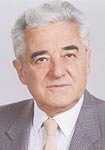 Professor
Imre Nagy
Professor
Imre Nagy
University of Debrecen, Medical and Health Science Center,
Debrecen, Hungary
Born in Hungary (1936), took the MD degree at the University Medical School of Debrecen (DOTE), Hungary, in 1961, with the Award “Sub Auspiciis Rei Publicae Popularis”. Working places: 1960-63: DOTE, Institute of Anatomy, assistant professor. 1963-73: Institute of Biology of the Hungarian Academy of Sciences, Tihany, Hungary, Vice-Director during the last 5 years of this period. 1973-76: Dipartimento di Ricerche Gerontologiche, INRCA, Ancona, Italy, scientific coordinator. 1976-79: Institute of Biology, DOTE, scientific adviser. 1979-96: founder and scientific coordinator of the “Verzár International Laboratory for Experimental Gerontology” (VILEG), being a Hungarian-Italian joint research laboratory (Debrecen-Ancona). 1982: founder, and until today Editor-in-Chief of the international scientific journal “Archives of Gerontology and Geriatrics” published by ELSEVIER. 1985: nominated as University Professor in Hungary. 1997: the DOTE established the Department of Gerontology, transforming the organization of VILEG at Debrecen. Head of this Department until the age of 65 (2001), when by the pension law had to give up this position, but has continued since than his teaching and research activity as a member of Department of Geriatrics, 3rd Medical Clinic of Faculty of Medicine, University of Debrecen, until the end of 2006, when definitively retired from his University position. In 2002: obtained the “Monte Carlo Award for Excellence in Anti-Aging Medicine”. In 2009 the A4M in US gave him the Infinity Award. In addition to Hungarian, speaks English, Italian, German and Russian. Published 280 scientific papers, including several book chapters and books. Gave about 350 scientific lectures.
2011 - Aging May Be Considered as an Adult Growth Hormone Deficiency Syndrome (AGHDS): This Statement Offers a Solid Basis for a General Consensus of Gerontologists
During the recent years, there has been an unusually strong confrontation of views between the American Medical Association (1) and The American Academy of Anti-Aging Medicine (A4M) (2). This conflict called our attention once again to the problem of the lack of consensus of gerontologists on the the basic nature of the aging process. Evidently, in a short lecture is impossible to treat all the relevant aspects of this complicated story. Nevertheless, this author will attempt to point out the main issues of theoretical feasibility of such a consensus, starting from the human GH-replacement therapy. There is no doubt that this replacement shows extensive beneficial effects against aging. The comprehensive explanation of the aging process called “membrane hypothesis of aging” (MHA) (3) offers a well-established, solid basis for the interpretation of the observed beneficial effects of the hGH. Namely, this species-specific pituitary peptide hormone has receptors in the plasma membrane of practically all types of cells (4), and its production decays about 16% per decade after having reached the maturity. In some individuals this decay is even much faster, causing the so-called adult growth hormone deficiency syndrome (AGHDS). The activation of the GH-receptors stimulates the membrane transport functions, rehydrates the intracellular colloids, speeds up protein synthesis and turnover, and activates a great number of cellular functions, all observed so far (4). Independently from the above conflict of views on the nature of aging, all these anti-aging effects require an independent, open-minded approach to the problem, and forces us to better understand the results of aging research. This may help to clarify also the wide variety of contradictions of the theoretical gerontology, which had resolved very few issues so far. On the other hand, both the human society and the health authorities expect from the basic research that gerontologists can finally identify at least the basic biological mechanisms of aging. The achievement of such a consensus seems to be feasible and useful for the future of both the aging population and the actually existing field of aging research.